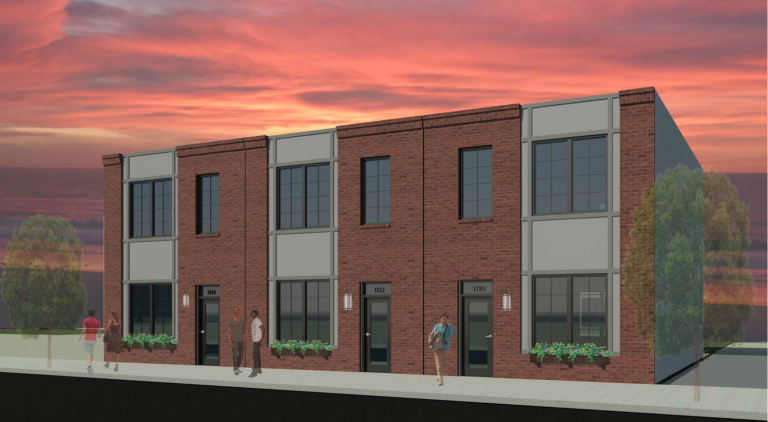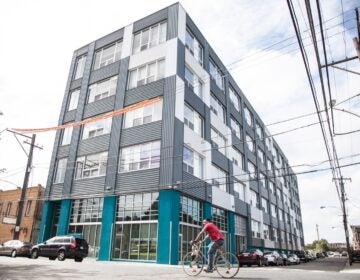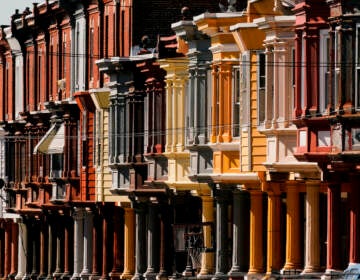Philly developer breaks ground on 26 affordable homes in gentrifying West Poplar
The energy-efficient, 1,300-square-foot homes are already being promoted for sale at $229,999 each.

A rendering of single-family homes planned for 1100-1114 Wallace Street in West Poplar. (Courtesy of Frankel Enterprise)
This article originally appeared on PlanPhilly.
—
A Philadelphia-born company broke ground Monday on a West Poplar development that city officials are billing as the latest advancement in a plan to create 1,000 new housing units for middle-income households.
The West Poplar Homes will put 26 new single-family dwellings priced at $229,999 in a section of the city where real estate values have been steadily rising for more than a decade. The buildings will rise on vacant, city-owned lots near North 11th and Wallace streets, within walking distance of the Broad Street Line’s Fairmount and Spring Garden stations, and less than a mile from City Hall. Built as a part of the city’s Workforce Housing Initiative, City Council President Darrell Clarke said they will house families caught in the middle of the city’s development boom.
“There was a certain price point we were missing that people that had lower incomes could probably qualify for some of the other developments,” said Clarke. “But the people that had incomes that were not as [low] as they needed to qualify for that were missing out.”
The city initiative offers publicly owned land to affordable housing developers at a reduced price with the hope of incentivizing them to build the below-market-rate homes in neighborhoods like West Poplar where real estate values are rising. The median home value in the neighborhood is $371,000 and ticking up, according to the latest estimates by Zillow.
A 2018 analysis by Rentcafe researchers ranked the 19123 zip code that encompasses West Poplar as well as adjacent Callowhill and Northern Liberties as among the top 10 most gentrified zip codes in the United States. Between 2000 and 2016, the 19123 area saw home values shoot up 203 percent, household income grow by 95 percent and the population of college-educated residents increase by 230 percent.
The land for West Poplar Homes came from the Land Bank, and the Redevelopment Authority provided credit support for a construction loan to Frankel Enterprise, the fourth-generation family-owned and operated development company behind the project. The loan came from the Reinvestment Fund, an organization that invests in low-income neighborhoods.
Max and Zachary Frankel — Philadelphia-bred brothers— run the company’s Philadelphia operation. The company also has an office in Florida. The Frankel brothers grew up in Center City in the 1990s — Max is 33 and Zachary is 30. Zachary Frankel said the project is their way of “honoring the integrity and grit that characterized Philadelphia.”
At the groundbreaking on Monday, Angel Rodriguez, executive director of the Philadelphia Land Bank, praised the “strategic partnership” between City Council, the Redevelopment Authority, and “a developer who is willing to work with us to come out with a product that Philadelphians need.”
“You’ve got two different public agencies, you got a private developer, private financing this is a true public-private partnership,” said Greg Heller, the PRA’s executive director.
The planned energy-efficient, 1,300-square-foot homes are already being promoted for sale at $229,999 each. There will be two-bedroom and three-bedroom layouts available, patios and stainless steel appliances, according to the developer.
Eligible buyers will make no more than 120 percent of the area median income. For example, an individual can make no more than $73,440, and a household of four can make no more than $104,880.
The homes are expected to be complete by spring 2019, and for neighbors, they will be welcome additions.
Arthur Green, 66, has lived in the area since 1990. On Monday, he seemed elated to see construction officially begin.
He said the new houses carry the potential to change the culture of the neighborhood.
“Now with this new development there’s hope,” he said. “And now you’re going to have people who live in the community invest in the community, which is important.”
WHYY is your source for fact-based, in-depth journalism and information. As a nonprofit organization, we rely on financial support from readers like you. Please give today.







